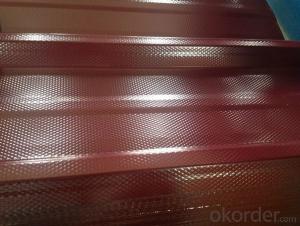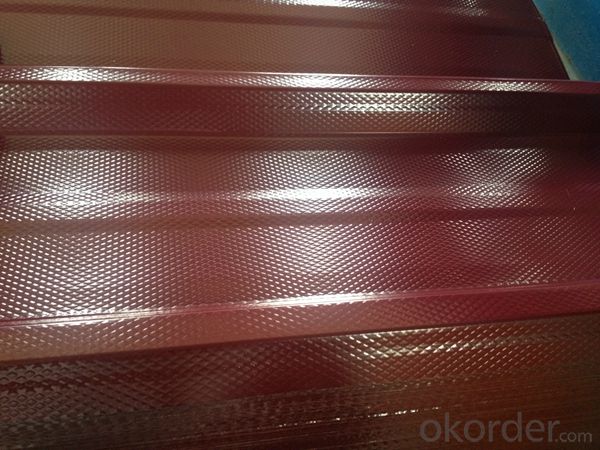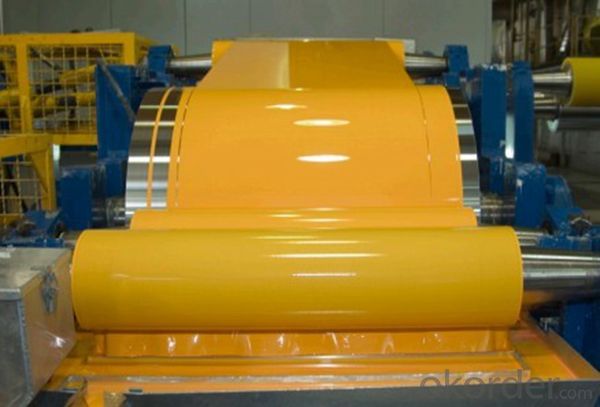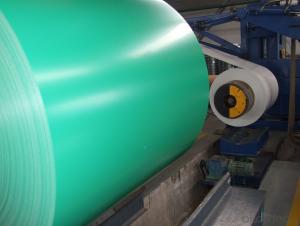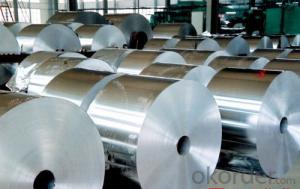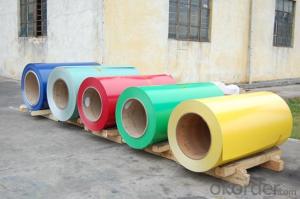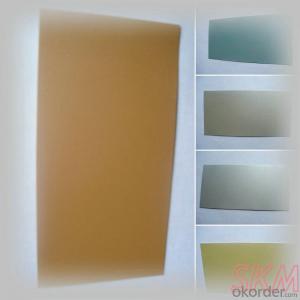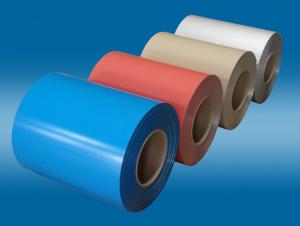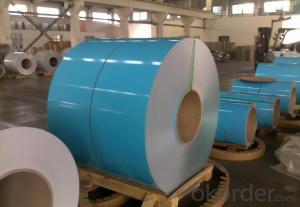Aluminum Coil Coating - Pre-Painted Colored Aluminum Coil in Roll for ACP Panel
- Loading Port:
- Shanghai
- Payment Terms:
- TT OR LC
- Min Order Qty:
- 5 m.t.
- Supply Capability:
- 10000 m.t./month
OKorder Service Pledge
OKorder Financial Service
You Might Also Like
Specification
1. Specification of Pre-painted Colored Aluminum Coil in Roll for ACP Panel
characteristics | Application |
1) Super peeling strength | 1) Building exterior curtain walls |
2) Excellent surface flatness and smoothness | 2) Decoration and renovation additions for old buildings |
3) Superior weather, corrosion, pollutant resistance | 3) Decoration of interior walls, ceilings, bathrooms, kitchens and balconies |
4) Even coating, various colors | 4) Shop door decorations |
5) Fireproof, excellent heat and sound insulation | 5) Advertisement board display platforms and signboards |
6) Superior impact resistance | 6) Wallboards and ceilings for tunnels |
7) Lightweight and easy to process | 7) Industrial materials, materials for vehicles and boats |
2. Application of Pre-painted Colored Aluminum Coil in Roll for ACP Panel
(1).Interior: wall cladding, ceilings, bathrooms, kitchens and balconies, shutters, doors...
(2).Exterior: wall cladding, facades, roofing, canopies, tunnels,column covers , renovations...
(3).Advertisement: display platforms, signboards, fascia, shop fronts...
3. Feature of Pre-painted Colored Aluminum Coil in Roll for ACP Panel
*Such coil is specially designed to replace aluminum ingot, due to the high export tax of aluminum ingot, the coil has better price than ingot.
*This type of coil can fit customer's remelting furnace just like ingot, no need to make any change to the production line that was previously used for ingot. The standard coil size and weight is very suitable for the feed gate of furnace.
*This type of coil causes less material wastage than ingot when remelted.
*Our coil is made directly from ore, no need to go though the ingot making process, quality is much better than other suppliers who use ingot scrap to make coil.
Be free from Oil Stain, Dent, Inclusion, Scratches, Stain, Oxide Dicoloration, Breaks, Corrosion, Roll Marks, Dirt Streaks and other defect which will interfere with use
4. Certificate:
SGS and ROHS(if client request, paid by client), MTC(plant provided), Certificate of Origin(FORM A, FORM E, CO), Bureau Veritas and SGS (if client request, paid by client), CIQS certificate
5. Image of Pre-painted Colored Aluminum Coil in Roll for ACP Panel
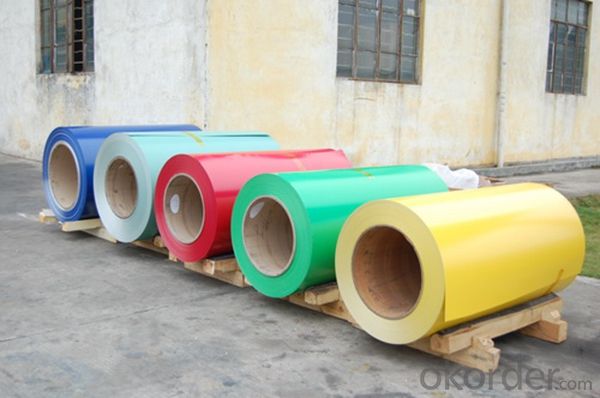
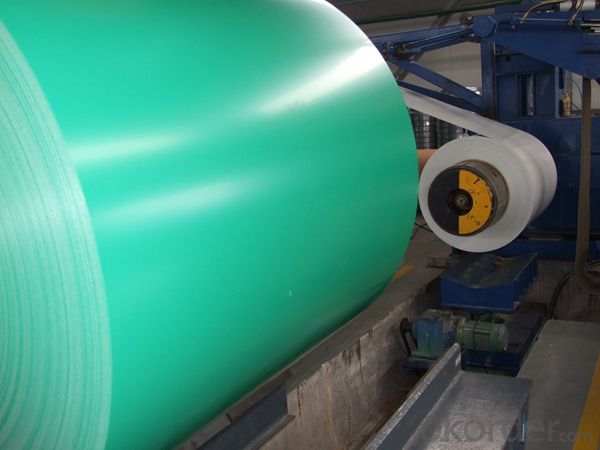
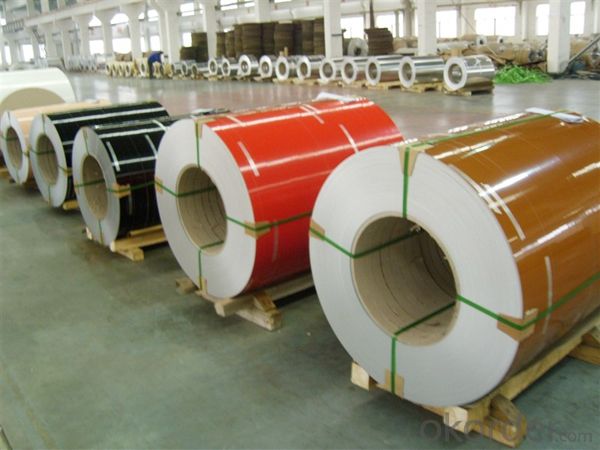
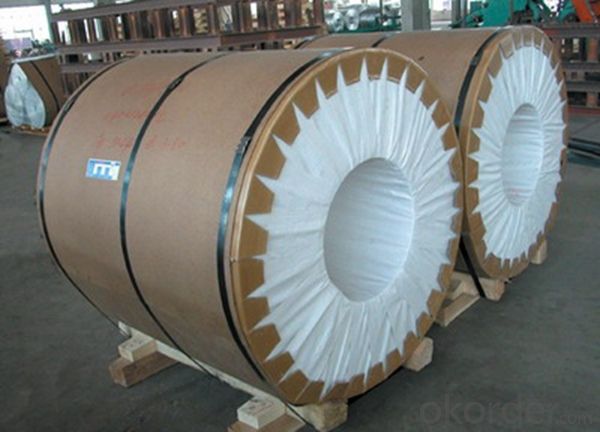
6. Package and shipping of Pre-painted Colored Aluminum Coil in Roll for ACP Panel
eye to wall
eye to the wall
with wood pallet (wooded case also available)
7. FAQ
1) What is the delivery time?
Dpends on actual order, around 20 to 35 days
2)What is the QC system:
We have QC staff of 20 persons and advanced equipment, each production is with MTC traced from Aluminum ingot lot.
3) What market do you mainly sell to?
Australia, America, Asia, Middle East, Western Europe, Africa etc
- Q: How are aluminum coils used in the production of medical equipment?
- Aluminum coils are commonly used in the production of medical equipment due to their excellent conductivity, lightweight nature, and corrosion resistance. These coils are primarily utilized in various medical devices such as MRI machines, X-ray equipment, and ultrasound scanners. Aluminum coils are used in these applications for their ability to efficiently dissipate heat, transmit electrical signals, and provide structural support. Additionally, the flexibility of aluminum coils allows for easy customization and shaping to meet the specific design requirements of medical equipment.
- Q: Are aluminum coils suitable for architectural roofing systems?
- Architectural roofing systems can indeed make use of aluminum coils. The popularity of aluminum as a roofing material stems from its many advantages. To begin with, aluminum is lightweight, making it easy to handle during installation and decreasing the burden on the building's structure. Furthermore, aluminum is highly durable and resistant to corrosion, ensuring that it will last for a long time as a roofing option. Its exceptional thermal properties are worth noting as well, as it can reflect heat and lead to reduced energy consumption. Another advantage is the ease with which aluminum coils can be molded and shaped into various profiles and designs, allowing for flexibility in architectural styles. Lastly, aluminum is an environmentally friendly choice for roofing systems, as it is both recyclable and sustainable. In conclusion, aluminum coils are a practical and suitable choice for architectural roofing systems, offering durability, versatility, and energy efficiency.
- Q: This question asks for methods to check the quality of aluminum coils.
- <p>To inspect aluminum coils for quality, follow these steps: Visually inspect for any surface defects like scratches, dents, or discoloration. Measure the thickness and width to ensure they meet specifications. Check the hardness and tensile strength using appropriate testing equipment. Examine the coil's flatness and straightness to avoid issues in further processing. Assess the surface roughness and cleanliness, as these can affect the coil's performance. Conduct a chemical composition analysis to confirm the alloy type and purity. Perform a magnetic particle inspection or ultrasonic testing to detect any internal defects. Finally, ensure the coil meets the required mechanical properties and specifications as per industry standards.</p>
- Q: What are the bending and forming capabilities of aluminum coils?
- Due to its inherent properties as a malleable and ductile material, aluminum coils possess outstanding abilities in bending and forming. The high strength-to-weight ratio of aluminum allows for easy shaping and forming without compromising its structural integrity. In terms of bending, aluminum coils exhibit remarkable flexibility and can be bent into various shapes and angles without any risk of fracturing or cracking. This flexibility enables the formation of tight curves or gentle bends, making aluminum coils suitable for a wide range of applications. Particularly in industries such as construction, automotive, and aerospace, where curved or intricate shapes are often needed, the flexibility of aluminum coils proves to be highly advantageous. In the realm of forming, aluminum coils can be effortlessly manipulated into different forms, including flat sheets, tubes, or intricate profiles. This versatility makes aluminum coils highly sought after in industries that prioritize customization and design flexibility. Moreover, aluminum coils can undergo various forming processes, such as roll forming, stamping, and deep drawing, which allow for the transformation into different products with precise dimensions and tolerances. These exceptional forming capabilities make aluminum coils the preferred choice for manufacturing components like automotive body panels, roofing materials, heat exchangers, and structural elements. In conclusion, the exceptional bending and forming capabilities of aluminum coils make them an ideal choice for applications that demand flexibility, durability, and design versatility.
- Q: How are aluminum coils stored to prevent damage?
- Aluminum coils are typically stored in a clean, dry, and well-ventilated area to prevent damage. They are often stacked horizontally or vertically on pallets or racks to ensure stability and avoid bending or deformation. Additionally, protective coverings or packaging materials such as plastic wraps or cardboard boxes may be used to shield the coils from moisture, dust, and other potential sources of damage.
- Q: Is it possible to join steel coils using arc welding or gas welding techniques?
- <p>Yes, steel coils can be welded together using both arc welding and gas welding methods. Arc welding, specifically processes like Shielded Metal Arc Welding (SMAW) and Gas Metal Arc Welding (GMAW), is commonly used for joining steel due to its strength and versatility. Gas welding, which uses a fuel gas and an oxygen mixture to produce a flame, is also suitable for steel welding, although it may be less common in industrial settings due to the higher heat input and potential for distortion. Proper techniques and equipment are essential to ensure a strong, durable weld and to avoid defects such as cracking or warping.</p>
- Q: Are there any limitations on the anodizing of aluminum coils?
- Yes, there are certain limitations on the anodizing of aluminum coils. Firstly, the size and weight of the aluminum coils can impose limitations. Anodizing is typically done in tanks or baths, so the size of the coil must fit within the capacity of the tank. Additionally, larger and heavier coils may require specialized equipment or processes to ensure proper anodizing. Secondly, the alloy composition of the aluminum coils can affect the anodizing process. Different aluminum alloys have varying levels of response to anodizing, and some alloys may not anodize as well as others. It is important to consider the alloy composition and consult with experts to determine the suitability and potential limitations of anodizing specific aluminum coils. Thirdly, the surface condition of the coils can impact the quality of anodizing. Any imperfections such as scratches, dents, or surface contaminants can affect the evenness and consistency of the anodized layer. It is essential to ensure that the coils are properly cleaned and prepared before anodizing to achieve desired results. Lastly, certain design features or complex shapes of the aluminum coils can pose limitations on anodizing. Anodizing involves the immersion of the coil in an electrolyte solution, and intricate designs or complex shapes may make it challenging to achieve uniform coating thickness. Specialized masking or racking techniques may be required to overcome these limitations. It is important to work closely with anodizing experts or service providers to understand and address any limitations specific to the aluminum coils and achieve the desired anodizing results.
- Q: Are there any limitations to the widths of aluminum coils?
- Yes, there are limitations to the widths of aluminum coils. The width of aluminum coils is typically determined by various factors such as the manufacturing process, equipment capabilities, and industry standards. One limitation is the maximum width that the manufacturing equipment can handle. Coil processing machines have specific width capacities, which generally range from a few inches to several feet. If an aluminum coil exceeds the maximum width that the machine can accommodate, it may not be possible to process it. Another limitation is related to transportation and handling. Aluminum coils that are too wide may not fit within standard shipping containers or may be difficult to maneuver during transportation. Additionally, wide coils may require specialized handling equipment or additional support, which can increase costs and logistical challenges. Industry standards and application requirements also play a role in determining the limitations of aluminum coil widths. Different industries and applications have specific width requirements for their products. For example, the construction industry may have specific width specifications for roofing or cladding materials, while the automotive industry may have different requirements for body panels. Manufacturers need to consider these standards and customer needs when determining the maximum and minimum widths of aluminum coils. In summary, while aluminum coils can be produced in various widths, there are limitations due to manufacturing equipment capabilities, transportation constraints, and industry standards. These limitations must be considered to ensure the efficient production, handling, and utilization of aluminum coils in different applications.
- Q: What are the factors that affect the price of aluminum coils?
- There are several factors that can influence the price of aluminum coils. These include the cost of raw materials, such as the price of aluminum ingots, which can fluctuate based on global supply and demand dynamics. Additionally, factors like production and manufacturing costs, energy expenses, transportation costs, and market competition can all impact the final price of aluminum coils.
- Q: Are aluminum coils suitable for beverage can manufacturing?
- Yes, aluminum coils are suitable for beverage can manufacturing.
Send your message to us
Aluminum Coil Coating - Pre-Painted Colored Aluminum Coil in Roll for ACP Panel
- Loading Port:
- Shanghai
- Payment Terms:
- TT OR LC
- Min Order Qty:
- 5 m.t.
- Supply Capability:
- 10000 m.t./month
OKorder Service Pledge
OKorder Financial Service
Similar products
Hot products
Hot Searches
Related keywords
